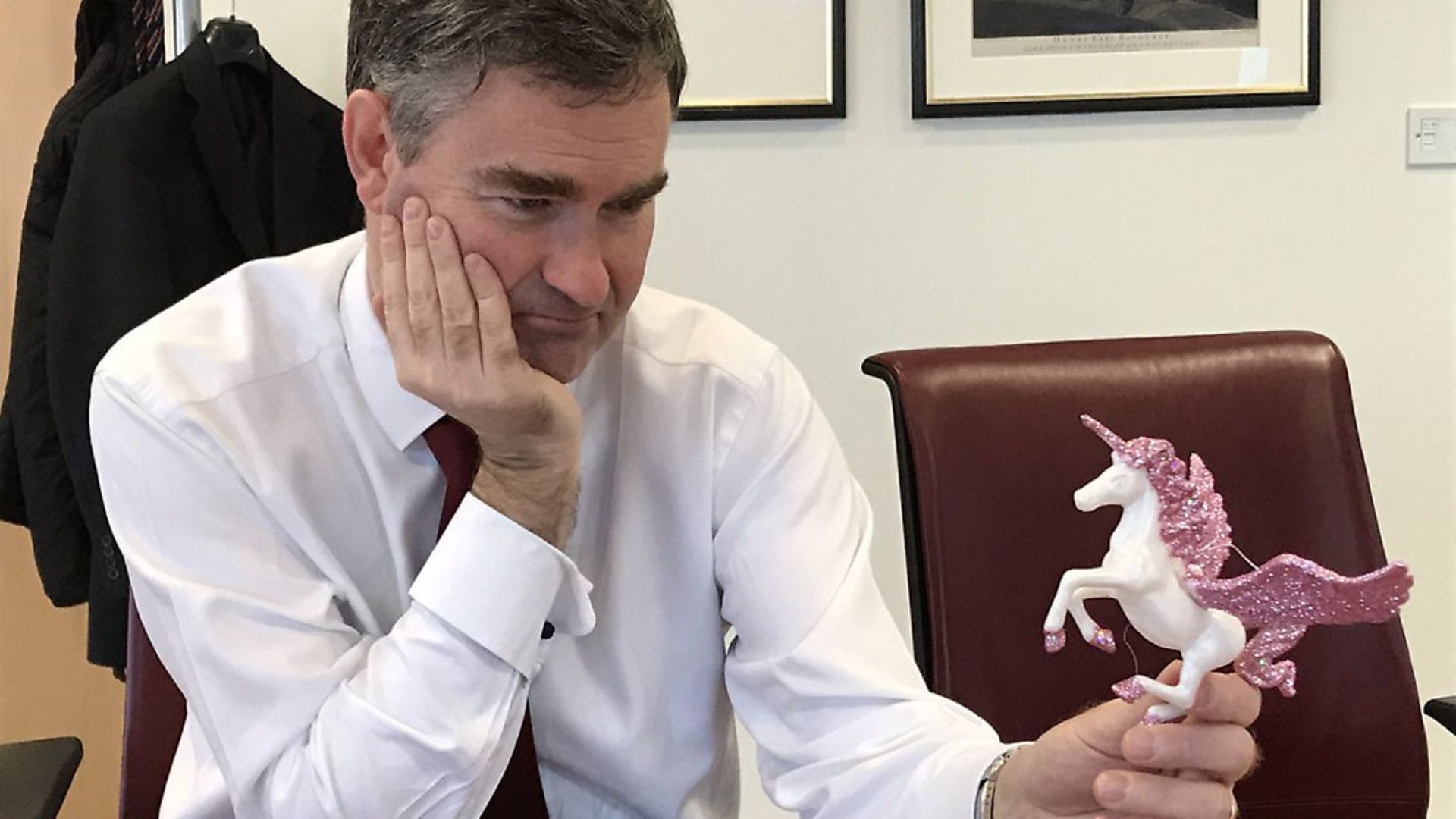
STEVE ANGLESEY rounds up another week on planet Brexit and crowns the Brexiteer of the week.

As darkness begins to fall across the sunlit uplands, a thundering of hooves can be heard like a train in the distance. Unicorns! Thousands of them!
The mythical animals, which have become a shorthand for unattainable Leaver fantasties, were everywhere again this week. In the name of the Altrincham pub which is directly below the registered base of Labour breakaway faction The Independent Group. At the centre of a controversy involving Lib Dem MEP Catherine Bearder, who was dropped from an Oxford University debate with Daniel ‘Marshall Plan Dan’ Kawczynski after she tweeted she would be ‘trying to put the little unicorns Daniel lets free every now and then back in their stables’. And, of course, on the cover of The New European.
Even the most powerful woman in British politics is using the phrase. ‘I am really worried that the delay and the drift and the chasing of unicorns means we could now end up with a no-deal by accident,’ said Yvette Cooper last month.
The one-horned wonders have their own magical powers which can be conjured up to devastating effect. Who now talks of a ‘managed-no deal’ after justice secretary David Gauke memorably told a pre-Christmas cabinet meeting that the idea was ‘a unicorn that needs to be slaughtered’? He received a sparkly pink-and-white toy unicorn as a Secret Santa gift for his efforts.
More recently Emily Maitlis has slapped down Matt Hancock by telling him to ‘park the unicorns’, and Beth Rigby silenced Boris Johnson by telling him that Donald Tusk had declared the backstop not open for negotiation ‘just as (Theresa May) rides off on her unicorn to Brussels… You lot are deluded. It’s not happening.’
But where did all these fantastic beasts come from in the first place? Though it seems impossible to think of anything lasting longer than Brexit, unicorns have been depicted since the Bronze Age and were popular with the ancient Greeks (who thought they lived in India), in Middle Ages Britain (where they represented Christ) and 15th century Scotland (as a symbol of independence). A staple of fantasy fiction from 1871’s Alice Through the Looking Glass to 1982’s Blade Runner, they had a mid-1980s moment with Legend at the movies and She-Ra on TV.
But 2013 was when the unicorns really returned. First in a financial phrase coined by seed fund investor Aileen Lee to a privately-owned start-up business valued at $1 billion or more, and then when My Little Pony, the rebooted 1980s toys-and-TV franchise, added unicorns to its roster of characters, triggering a worldwide explosion of unicorn inflatables, clothes, toys, books and games. In 2017, ‘unicorn’ overtook ‘mermaid’ in Google searches for the first time and by last Christmas one of the UK’s most sought-after toys was Poopsie, a unicorn which defecates glitter.
Which naturally brings us back to Brexit.
The writer and actor David Schneider, whose credits include The Death Of Stalin was an early adopter of the term but told TNE, ‘Not sure where it started but it’s perfect because unicorns are beautiful but don’t exist. Like the Brexit promises.
‘The one big Brexit dividend has been analogies – the Titanic, King Canute – and unicorns is the Ur-Brexit metaphor, if you’ll pardon my very metropolitan elite language, the archetype.
‘I think I coined the term unicornology and unicornologists for Brexit bullshit and Brexiters. My favourite Brexit-related term alongside catastrofuck.’
A month before the referendum, the economist and Glasgow University principal, professor Anton Muscatelli, told The Guardian ‘Leave campaigners have tried to conjure up such a fantasy world in which, after leaving the EU, Britain has an opportunity to design its own economic environment with its ideal configuration of free trade, limited labour mobility, less regulation and foreign investment… with the odd unicorn and fairy thrown in for good measure’.
Search Twitter though and the earliest reference seems to come from and @eurocrat, aka banking analyst Gergely Polner, on September 13, 2015: ‘A ‘Brexit campaign built on solid intellectual base’ is like a unicorn, the stuff of many legends.’ Some 41 months later, to coin another Brexit phrase, nothing has changed. Put Poopsie in charge.
**********
Just as vintage Donald Trump tweets like ‘we need a President who isn’t a laughing stock to the entire world’ return to haunt him, the Brexiteers are increasingly hoist by their own petards.
In September 2015 Daniel Hannan tweeted: ‘The idea that car manufacturers might disinvest after we leave the EU? It’s a – what’s the word? – Oh yes, lie.’
In July 2018 John Redwood posted a lengthy tirade about Project Fear and carmakers. ‘One of the most deceitful arguments some Remain advocates use is that the car industry depends on the EU for its success and would be adversely affected if we leave,’ he wrote, adding ‘In recent years leading foreign car makers have praised UK work forces and increased their investment.’
Then came January 2019, when the Society of Motor Manufacturers revealed investment had gone down 46% in a single year. And now 3,500 job losses at Honda’s Swindon plant seems to contradict a Leave.EU tweet from September last year that boasted ‘Honda ‘right behind continued production’ at its UK base in Swindon, whatever happens with Brexit. Don’t expect the mainstream media to bang on about this too much though, far too positive…!’
Like so many jobs, however, that tweet has since been deleted.
BREXITEERS OF THE WEEK
4. Arlene Foster
Just in case you were in any doubt about the calibre of people propping up Theresa May’s zombie government, Foster’s DUP launched their campaign for May’s local elections with the banner ‘Strength To Deliver’
That is STD for short – the very definition of a catchy slogan – which has brought joy to Foster’s rivals, with Ulster Unionist Doug Beattie joking that Arlene’s manifesto should be titled ‘Do you have an STD? The DUP have’.
At this rate, Foster will have to rethink her whole campaign strategy, which is said to be titled ‘Hate Europe, Rather Praise English Settlers’ Now, at least there’s no unsavoury acronym for that…
3. Jacob Rees-Mogg
Brexiteers have the best comic timing. When a woman in last week’s Question Time audience complained that Brexit was making it impossible to run her business, the real-life Professor Yaffle Rees-Mogg shot back: ‘A leading figure in INEOS, a major chemicals company, has written to Mr Juncker to say that the regulations from the EU have made investment not worth doing because they are strangling business.’
That leading figure was actually a leaving figure – Sir Jim Ratcliffe, who 48 hours later was revealed to be planning to quit Britain for Monaco, costing the Treasury between £400 million and £4 billion in taxes.
2. Gavin Williamson
As the furore over his sabre-rattling ‘enhance our lethality’ speech continued to damage Britain, the Brexiteer defence secretary headed to the Arctic Circle to take part in a Royal Marines drill, in which they cut holes into the ice, jump into the glacial water below and claw themselves out with ski poles.
To the huge relief of those civil servants who have been working on the trade deals with China and Japan which Gavin’s loose lips might have torpedoed, he survived. But there’s surely a Brexit analogy in gleefully throwing yourself into life-threatening conditions for no good reason whatsoever.
1. Peter Shilton
The former England goalkeeper, a keen Brexiteer, appeared on Nigel Farage’s LBC show to discuss Brexit and explained why there shouldn’t be a second referendum. He said: ‘God forbid, if Labour got voted in and in two years didn’t live up to their mandate, what are we going to say – that we should have another election?’ Well, yes, Peter. We have them every five years or so, unlike referendums, and that’s part of the problem.
Shilts went on to tell Farage that he was against a new vote because ‘you’ve got to have rules’. Yet – quite justifiably – he’s spent a good part of the last 33 years complaining about Diego Maradona’s illegal Hand of God goal in the 1986 World Cup. In 2017 he told Hayters: ‘The linesman said he saw it but he couldn’t put his flag up because of the rules.’ What if the ‘rules’ are wrong?
Warning: Illegal string offset 'link_id' in /mnt/storage/stage/www/wp-includes/bookmark.php on line 357
Notice: Trying to get property 'link_id' of non-object in /mnt/storage/stage/www/wp-includes/bookmark.php on line 37







